 118 citations,
July 2005 in “Journal of Ethnopharmacology”
118 citations,
July 2005 in “Journal of Ethnopharmacology” Eclipta alba extract improved learning, memory, and stress-related ulcers in rats without affecting movement or causing anxiety.
[object Object]  52 citations,
September 2018 in “International Journal of Molecular Sciences”
52 citations,
September 2018 in “International Journal of Molecular Sciences” Ginseng and its compounds may help hair growth and prevent hair loss, but more human trials are needed to confirm this.
 42 citations,
February 2021 in “Signal Transduction and Targeted Therapy”
42 citations,
February 2021 in “Signal Transduction and Targeted Therapy” Hair follicle regeneration possible, more research needed.
 40 citations,
November 2016 in “Molecules”
40 citations,
November 2016 in “Molecules” Some plants used in traditional medicine may help treat cancer because they contain proteins that can inactivate ribosomes.
 13 citations,
October 2017 in “Bioscience, Biotechnology, and Biochemistry”
13 citations,
October 2017 in “Bioscience, Biotechnology, and Biochemistry” Centella asiatica extract may help promote hair growth by blocking a specific cell signaling pathway.
 7 citations,
January 2017 in “Skin Pharmacology and Physiology”
7 citations,
January 2017 in “Skin Pharmacology and Physiology” ECOHAIR® lotion is effective and safe for improving hair growth and reducing hair loss.
 7 citations,
January 2015 in “Evidence-based Complementary and Alternative Medicine”
7 citations,
January 2015 in “Evidence-based Complementary and Alternative Medicine” The review suggests renaming two herbs to avoid confusion and recommends more research for safe use.
 2 citations,
May 2022 in “Ethnobotany research and applications”
2 citations,
May 2022 in “Ethnobotany research and applications” Traditional medicinal plants are still widely used and could help local development and inter-ethnic relationships.
 1 citations,
January 2016 in “Springer briefs in molecular science”
1 citations,
January 2016 in “Springer briefs in molecular science” Natural plant-based substances can be used as effective hair dyes.
 May 2024 in “Research Square (Research Square)”
May 2024 in “Research Square (Research Square)” Many women in Northern Ghana use plant-based cosmetics like shea butter, and their use is more related to being married than to their job, education, or house.
 December 2023 in “Migration letters”
December 2023 in “Migration letters” Herbal treatments can help manage PCOS symptoms.
 September 2023 in “Research Square (Research Square)”
September 2023 in “Research Square (Research Square)” Evening primrose oil significantly improves hormone levels and reduces BMI and cholesterol in women with PCOS.
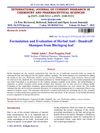 July 2023 in “International journal of current research in chemistry and pharmaceutical sciences”
July 2023 in “International journal of current research in chemistry and pharmaceutical sciences” The shampoo made with Bhringraj leaf and other natural ingredients shows promise as a natural dandruff solution.
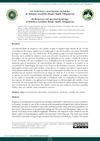 December 2020 in “Rev. Amazon.”
December 2020 in “Rev. Amazon.” Monnina crassifolia, Aloe vera, and rosemary are commonly used for hair conditions in Angochagua, Ecuador.
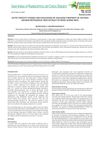 September 2019 in “Asian Journal of Pharmaceutical and Clinical Research”
September 2019 in “Asian Journal of Pharmaceutical and Clinical Research” Teak seed extract is safe and reduces pain in mice.

Pimpinella anisum L. extract significantly boosts hair growth in mice.
 April 2018 in “The journal of investigative dermatology/Journal of investigative dermatology”
April 2018 in “The journal of investigative dermatology/Journal of investigative dermatology” Androgens increase growth factors in skin cells, which may lead to acne.
1 citations,
June 2018 in “Pharmaciana” The hair tonic with 15% ethanol effectively promotes hair growth.
 April 2023 in “Jurnal Farmasi Indonesia”
April 2023 in “Jurnal Farmasi Indonesia” Candlenut oil and celery powder improved hair growth and could be a potential treatment for alopecia.
[object Object] 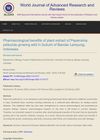 February 2022 in “World Journal Of Advanced Research and Reviews”
February 2022 in “World Journal Of Advanced Research and Reviews” Peperomia pellucida plant extract helps with hair growth, male libido, fertility recovery, and kidney cell protection.
22 citations,
June 1998 in “PubMed” Panax ginseng helps prevent hair follicle cell death and speeds up hair cell recovery after radiation in mice.
4 citations,
May 2021 in “Research Journal of Science and Technology” Hibiscus rosa sinensis shows promise for treating various health conditions and promoting hair growth.
 4 citations,
January 2019 in “International journal of bioorganic chemistry”
4 citations,
January 2019 in “International journal of bioorganic chemistry” Using medicinal plants traditionally helps in their preservation in Charmang Village, Pakistan.
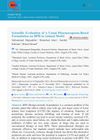 2 citations,
November 2023 in “International Journal of Preventive Medicine and Health (IJPMH)”
2 citations,
November 2023 in “International Journal of Preventive Medicine and Health (IJPMH)” The Unani Pharmacopoeia-Based Formulation significantly improved symptoms of enlarged prostate in rats.
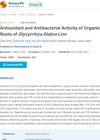 2 citations,
January 2017 in “Plant”
2 citations,
January 2017 in “Plant” The organic extracts from the roots of Glycyrrhiza Glabra Linn have antioxidant and antibacterial properties.
2 citations,
December 2016 in “Springer eBooks” Dermatologists need to understand diverse cultural hair practices to offer better care.
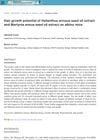 1 citations,
March 2024 in “International Journal of Pharmaceutical Sciences and Drug Research”
1 citations,
March 2024 in “International Journal of Pharmaceutical Sciences and Drug Research” Helianthus annuus and Martynia annua seed oils significantly promote hair growth.
1 citations,
February 2022 in “Research journal of pharmacy and technology” Wrightia tinctoria extract may promote hair growth better than minoxidil.
 November 2024 in “Journal of Cosmetic Dermatology”
November 2024 in “Journal of Cosmetic Dermatology” The plant extracts may help treat hair loss by promoting hair growth and reducing DHT levels.
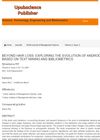 January 2024 in “World Journal of Management Science”
January 2024 in “World Journal of Management Science” Data visualization tools are crucial for understanding and advancing androgenetic alopecia research.

























